1. More Than 300,000 Farmed Atlantic Salmon Accidentally Released into Puget Sound
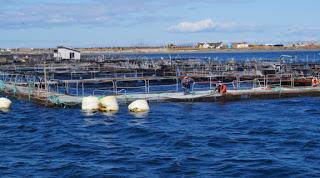 An aquaculture company, blaming the solar eclipse, on a net pen break, released 300,000 farmed Atlantic salmon into Puget Sound, Washington State. Washington is the only west coast state that allows farming of the non-native Atlantic salmon in net pens. The release could hurt the native fish populations, which include Chinook salmon and steelhead trout. When farmed Atlantic salmon escape into the wild, they compete with native populations for food and introduce disease and parasites.
An aquaculture company, blaming the solar eclipse, on a net pen break, released 300,000 farmed Atlantic salmon into Puget Sound, Washington State. Washington is the only west coast state that allows farming of the non-native Atlantic salmon in net pens. The release could hurt the native fish populations, which include Chinook salmon and steelhead trout. When farmed Atlantic salmon escape into the wild, they compete with native populations for food and introduce disease and parasites. ———————————————–
2. Ban on Single Use, Plastic Water Bottles in U. S. National Parks Removed
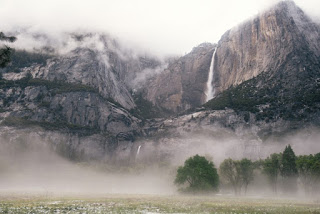
An Obama-era policy for national parks to voluntarily restrict plastic water bottle sales and encourage reusable water containers has been struck down by the Trump administration.
———————————————–
3. Microplastics Found in “Half of Deep Sea Creatures”
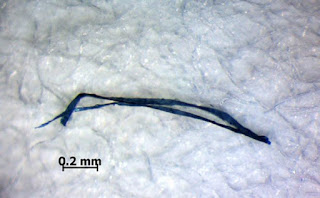 A study of deep sea invertebrates (starfish and snails) has found that 48 percent of them contained microplastics. This is consistent with studies of shallow water animals. Microplastics are considered any plastic under 5 mm in size. They are eaten by plankton and fish, are bioaccumulated as they move up the food chain, and are ultimately ingested by humans.
A study of deep sea invertebrates (starfish and snails) has found that 48 percent of them contained microplastics. This is consistent with studies of shallow water animals. Microplastics are considered any plastic under 5 mm in size. They are eaten by plankton and fish, are bioaccumulated as they move up the food chain, and are ultimately ingested by humans.———————————————–
4. More than 80 Whales a Year Are Killed By Ship Collisions off West Coast of U.S.
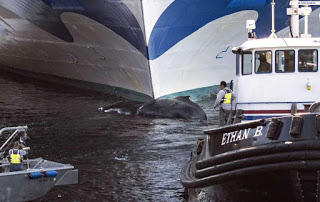 A new study has found that more than 80 whales, including blue whales, humpbacks and fin whales, are killed in boat collisions off of Washington State, Oregon, and California each year. Although the scientists were conservative with their estimates, they say that the actual numbers could be higher since many whales are struck and then sink. Scientists hope this study will convince shipping companies to expand the areas in which ships slow down to reduce collisions with whales and other wildlife.
A new study has found that more than 80 whales, including blue whales, humpbacks and fin whales, are killed in boat collisions off of Washington State, Oregon, and California each year. Although the scientists were conservative with their estimates, they say that the actual numbers could be higher since many whales are struck and then sink. Scientists hope this study will convince shipping companies to expand the areas in which ships slow down to reduce collisions with whales and other wildlife.5. Many Coasts Losing Their Kelp Forests Due to Warming Ocean
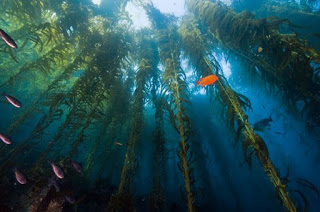 The latest victim to the warming ocean due to climate change is the coastal kelp forests around the world. These include kelp forests off the Gulf of Maine, Mediterranean Sea, southern Japan, Australia, and California. In addition to the warming ocean, invasive seaweed is the likely culprit in Maine, and in Australia, Mediterranean, and Japan, tropical fish have been eating the kelp. A study found that 38 percent of kelp forests have declined over the past 50 years.
The latest victim to the warming ocean due to climate change is the coastal kelp forests around the world. These include kelp forests off the Gulf of Maine, Mediterranean Sea, southern Japan, Australia, and California. In addition to the warming ocean, invasive seaweed is the likely culprit in Maine, and in Australia, Mediterranean, and Japan, tropical fish have been eating the kelp. A study found that 38 percent of kelp forests have declined over the past 50 years.
———————————————–
6. Endangered Whales Won’t Reach Pre-Hunting Numbers by 2100
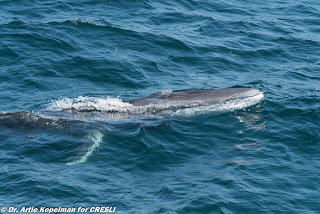 A new Australian study has found that by 2100, the populations of Antarctic blue, fin and southern right whales will not have recovered to their pre-whaling numbers. The humpback whale will reach their pre-whaling numbers by 2050. Humpbacks are currently at 32 percent of their pre-whaling numbers because they breed more quickly than the other whales in this study. The researchers looked at 2 million catch data records from 1890 to 2012.
A new Australian study has found that by 2100, the populations of Antarctic blue, fin and southern right whales will not have recovered to their pre-whaling numbers. The humpback whale will reach their pre-whaling numbers by 2050. Humpbacks are currently at 32 percent of their pre-whaling numbers because they breed more quickly than the other whales in this study. The researchers looked at 2 million catch data records from 1890 to 2012.
Read More...
———————————————–
7. Delaware Governor Opposes Offshore Drilling
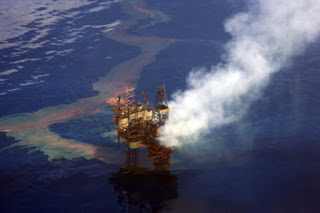 Delaware Governor John Carney is opposed to drilling for oil and gas off the Delaware or Atlantic coast. In a letter to U.S. Interior Secretary Ryan Zinke, Carney stated that “60,000 jobs support the fishing, tourism and recreation industries in Delaware, and that coast-related activities contribute almost $7 billion in economic production to the state.” The letter was sent in response to the Trump administration’s request for comments on the proposed five-year offshore oil and gas leasing program.
Delaware Governor John Carney is opposed to drilling for oil and gas off the Delaware or Atlantic coast. In a letter to U.S. Interior Secretary Ryan Zinke, Carney stated that “60,000 jobs support the fishing, tourism and recreation industries in Delaware, and that coast-related activities contribute almost $7 billion in economic production to the state.” The letter was sent in response to the Trump administration’s request for comments on the proposed five-year offshore oil and gas leasing program.
Be sure to “LIKE” http://facebook.com/SeaSave to ensure our “Week in Review” is delivered to your newsfeed every Friday.
Sea Save Foundation is committed to raising awareness of marine conservation. The Week in Review is a team effort produced by the Sea Save staff to provide a weekly summary of the latest in marine research, policy, and news.




